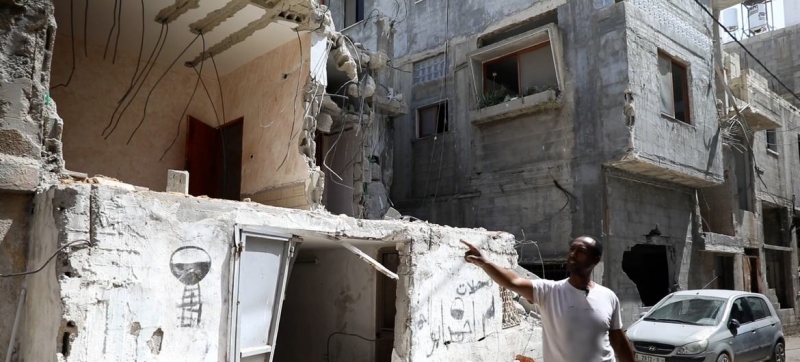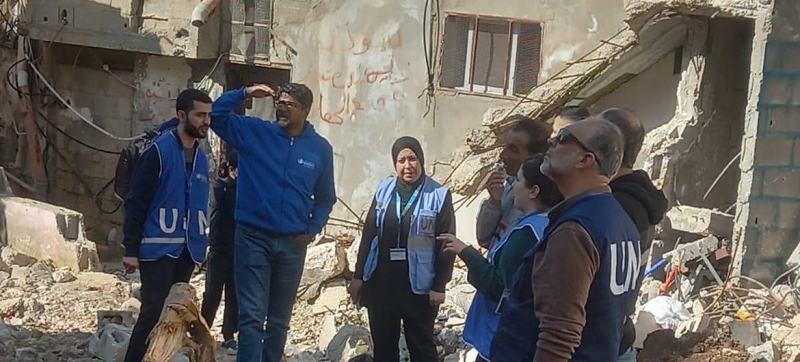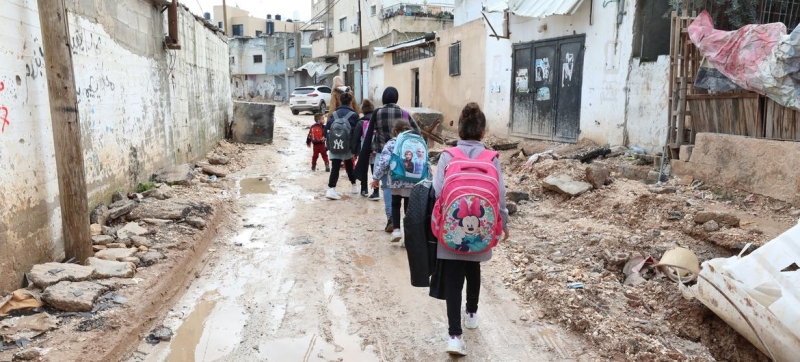
Palestinian refugee camp “Nur Shams” in the northern West Bank after an operation by Israeli troops. INTERVIEW | The West Bank has faded into the media headlines, but violence there continues Peace and Security
Since the Hamas attack on Israel on October 7, 2023, the world’s media attention has been focused on the events unfolding in Gaza and around the Strip. At the same time, the West Bank has practically disappeared from the attention of the press – despite the fact that the numerous problems faced by its residents have not gone away. The representative of the Office of the United Nations High Commissioner for Human Rights (OHCHR) in the occupied Palestinian territory, Ajit Sunghai, spoke about this in an interview with Anton Uspensky from the UN News Service.
Ajit Sunghai:The situation in the West Bank was very difficult even before October 7th. 2023 has been a particularly difficult year for the West Bank. We saw a general negative trend and there were many alarming signals. For example, there has been an increase in massive incursions by the Israeli Defense Forces into Jenin, Nablus and Tulkarem, and we have seen massive attacks in these camps.
We have seen the highest number of killings since then, how the UN began keeping records of dead and wounded in 2005. The rate was at its highest in 2023.
We also saw an uptick in other violations. For example, settler violence, excessive use of force by the IDF (Israel Defense Forces), unjustified use of force, demolition of houses, eviction of residents…
After October 7, attention turned to Gaza. Of course, Gaza needs attention. But a lot of important things are happening in the West Bank.
First, the violations we saw before October 7 have become more frequent and severe. In terms of the number of people killed and wounded as a result of the IDF’s massive incursions into the West Bank, it has risen sharply. The number of people detained in the West Bank has also increased sharply. About nine thousand people are currently detained there.
Everything that happens in Gaza has a huge impact on the West Bank. Everything that happens in the West Bank affects Gaza because they are the same people.

Ajit Sunghai (second from left) during a visit to Gaza in November 2023.
UN News Service: What are the urgent needs of the people of the West Bank? What worries you and your colleagues the most?
AC: What worries us most is the surge in violence we are seeing, especially from the settlers: because the attention is on Gaza, they feel at ease. There is widespread impunity in the West Bank for abuses committed by the IDF, so settlers continue to attack Palestinians and Palestinian towns and villages. Lack of protection and security is a major concern for us.
What worries us most is the surge in violence we are seeing, especially from settlers: as attention chained to Gaza, they feel at ease.
The Israeli Defense Forces are acting as if there is an armed conflict in the West Bank. However, we must not forget that the West Bank is subject to human rights laws, which means that the force that the IDF can use is limited by these legal frameworks. There is no armed conflict in the West Bank, but during its operations the IDF uses a huge number of soldiers, drones, sometimes fighter jets dropping bombs, heavy weapons… In other words, all those means are used that are usually used in an armed conflict, and not during law enforcement.
We see that the people of the West Bank are in great fear: they constantly fear incursions, raids, arrests and detentions, settler violence and massive restrictions on movement, that affects their daily lives.
UN News Service: When we talk about occupied territory, the occupying power is supposed to act as a party which maintains law and order. But, judging by what you describe, everything happens the other way around…
AC:Unfortunately, that’s the way it is. Under international law, the responsibility and duty of the occupying power is to provide protection. This is what is expected from Israel. This also applies to the IDF, which must provide security and protection to the population of the occupied territory, that is, the Palestinians.
However, we constantly see – and this has intensified since October 7 – that the IDF provides the safety of the settlers who are actually attacking the Palestinians. Many times we have seen that the Israeli military were bystanders. In other cases, they condoned such attacks. We began to notice that the settlers were wearing IDF clothing, so it was very difficult to distinguish them from the military.
Many times we saw that the Israeli military were by outside observers. In other cases, they condoned attacks.
Unfortunately, the IDF and –more broadly –Israel have failed to live up to their obligations under international humanitarian law, and, on the contrary, have committed even more human rights violations.
UN News Service: Who can protect Palestinians and their rights in such circumstances?
AU: Good question… There is a vacuum in the protection of Palestinians in many areas of the West Bank. For example, in cases of settler violence, Palestinians must file complaints with the Israeli police or the IDF, which are based in Israeli settlement areas. This doesn’t make any sense. If Palestinians are attacked by Israeli settlers, they have to go to the Israeli settlement to complain. But when they see a constant lack of responsibility, why would they do it?

Children walk through partially destroyed streets in Jenin in the West Bank.
UN News Service: You are interacting with Palestinian human rights groups?
AS: We record all types of violations, not only settler violence, but also the eviction of Palestinians from their homes, demolitions, detentions. We’re not doing this alone.
One of our main functions is to ensure that space is maintained for civil society, and we work very closely with a range of organizations, both Palestinian and Israeli. We have been building this network over many years. However, recently there has been a massive reduction in civic space – for various reasons.
For example, a couple of years ago, Israel, without any evidence, declared six human rights NGOs are terrorist organizations. When something like this happens, support for these NGOs decreases, whether we like it or not. We are trying to help NGOs do their work. It is very important that they are on the ground and can record violations, but NGOs are subject to pressure and intimidation.
Israeli NGOs face similar threats. For example, when the Israeli government threatened a 65 percent tax on any foreign funds received, it was intended to limit the power of Israeli NGOs.
However, the Office The UN High Commissioner for Human Rights continues to work with such organizations. We give them confidence that we are there. We appeal to Member States not to abandon them in the lurch and to continue funding.
UN News Service: What do you think about the prospects for a ceasefire in Gaza?
AU: I think the end fire is an urgent, urgent and pressing problem. We’ve talked about this many times. The invasion of Rafah will lead to huge casualties, massive violations of human rights, huge numbers of displaced people, separation of families.
There is no safe place left in Gaza. What to do with the displaced people? Khan Yunis has been bombed for the last four months, and there is no infrastructure left there; Al-Mawasi is crowded. People are struggling to meet their daily food needs or just basic needs.
But even more worrying is the prospect of the “limited invasion” escalating into a full-fledged offensive on Rafah . I am convinced that this cannot be allowed.
Read also:
